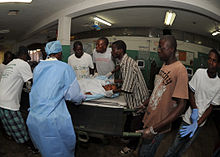

Deficient sanitation systems, poor nutrition, and inadequate health services have pushed Haiti to the bottom of the World Bank’s rankings of health indicators. According to the United Nations World Food Programme, 80 percent of Haiti’s population lives below the poverty line. In fact, 75% of the Haitian population lives off of $2.50 per day.[1] Consequently, malnutrition is a significant problem. Half the population can be categorized as "food insecure," and half of all Haitian children are undersized as a result of malnutrition. Less than half the population has access to clean drinking water, a rate that compares poorly even with other less-developed nations. Haiti's healthy life expectancy at birth is 63 years. The World Health Organization (WHO) estimates that only 43 percent of the target population receives the recommended immunizations.[2][3]
In 2013, there were approximately 800 primary care facilities in Haiti, with only 43% of these facilities being classified as good for accessible care. Only 8% of people living in rural areas have access to one of these facilities.[4]
In terms of health care spending, Haiti ranks last in the western hemisphere. Economic instability has limited any growth in this area. Per capita, Haiti spends about US$83 annually on health care. There are 25 physicians and 11 nurses per 100,000 population. Only one-fourth of births are attended by a skilled health professional. Most rural areas have no access to health care, making residents susceptible to otherwise treatable diseases. In 2003, for example, the WHO confirmed an outbreak of typhoid fever in Haiti that, because of a lack of access to doctors and safe water, led to dozens of deaths.[2]
Haiti has the highest incidence of human immunodeficiency virus/acquired immune deficiency syndrome (HIV/AIDS) outside of Africa. Sex tourism and lack of health education led to the beginning of the epidemic in the early 1980s. Estimates vary, but the United Nations projects the national prevalence rate to be 1.5 percent of the population. Other estimates place the rate as high as 5 percent in the urban population and 3 percent in rural regions. Annually, 5,000 Haitian babies are born infected with the AIDS virus. The disease causes a fifth of all infant deaths and has orphaned 200,000 children.[2]
The Human Rights Measurement Initiative[5] finds that Haiti is fulfilling 72.9% of what it should be fulfilling for the right to health based on its level of income.[6] When looking at the right to health with respect to children, Haiti achieves 87.0% of what is expected based on its current income.[6] In regards to the right to health amongst the adult population, the country achieves only 83.2% of what is expected based on the nation's level of income.[6] Haiti falls into the "very bad" category when evaluating the right to reproductive health because the nation is fulfilling only 48.3% of what the nation is expected to achieve based on the resources (income) it has available.[6]
- ^ Alfred, Jean-Patrick (September 2012). "[What is the real cost of universal health care in Haiti?]". Santé Publique (Vandoeuvre-Les-Nancy, France). 24 (5): 453–458. doi:10.3917/spub.125.0453. ISSN 0995-3914. PMID 23472986.
- ^ a b c Haiti country profile. Library of Congress Federal Research Division (May 2006). This article incorporates text from this source, which is in the public domain.
- ^ "The World Factbook — Central Intelligence Agency". 7 June 2022.
- ^ Gage, Anna D; Leslie, Hannah H; Bitton, Asaf; Jerome, J Gregory; Thermidor, Roody; Joseph, Jean Paul; Kruk, Margaret E (2017-03-01). "Assessing the quality of primary care in Haiti". Bulletin of the World Health Organization. 95 (3): 182–190. doi:10.2471/BLT.16.179846. ISSN 0042-9686. PMC 5328114. PMID 28250531.
- ^ "Human Rights Measurement Initiative – The first global initiative to track the human rights performance of countries". humanrightsmeasurement.org. Retrieved 2022-03-18.
- ^ a b c d "Haiti - HRMI Rights Tracker". rightstracker.org. Retrieved 2022-03-18.
© MMXXIII Rich X Search. We shall prevail. All rights reserved. Rich X Search
